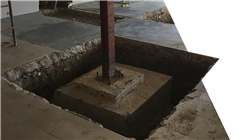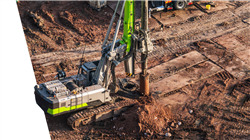University certificate
With this Practical Training you will take a definitive step in your career.”
Introduction to the Program
Through this innovative Internship program, you will implement the most advanced geotechnical monitoring programs to control soil behavior during construction and operation”

In a rapidly urbanizing environment, Geotechnical Engineering and Foundations face increasing challenges in soil stability and geotechnical risk mitigation. In this situation, the need to develop advanced design and construction techniques is becoming more and more urgent to ensure both the safety and durability of structures in adverse geotechnical conditions. In this regard, it is essential for engineers to keep abreast of the latest advances in geotechnical technologies to manage infrastructures efficiently. For this reason, TECH presents an innovative qualification consisting of a 3-week practical stay in a reference institution, where professionals will be updated on the latest advances in Geotechnical and Foundations.
A recent report by the International Association of Geotechnical Engineering estimates that more than 60% of structures worldwide require adequate foundations to ensure their long-term stability. As a result, more and more companies are calling for highly specialized geotechnical and foundation engineers. To take advantage of these opportunities, experts need to acquire a competitive advantage that differentiates them from other candidates. One way of doing this is for professionals to incorporate the most innovative geotechnical design techniques into their daily practice, which will contribute to improving both the safety and efficiency of foundation constructions.
In this scenario, TECH presents an avant-garde and eminently practical program consisting of a 120-hour stay in a reference entity in the field of Geotechnics and Foundations. In this way, during 3 weeks, the graduates will be part of a team of top level experts, with whom they will work actively in areas such as ground reconnaissance, slope stability or surface foundations. Thanks to this, the graduates will enjoy an update that will allow them to develop skills to experience a leap in quality in their careers as engineers.
It should be noted that, during this practical stay, students will have the support of an assistant tutor, who will be responsible for ensuring compliance with all the requirements for which this Internship Program has been designed. On this basis, the graduates will work with total guarantee and security in the handling of the most sophisticated technology. Therefore, the students will live an enriching experience that will allow them to optimize their daily practice.

Teaching Objectives
Through this revolutionary Internship program, engineers will master the principles of Geotechnics and Foundations. In this sense, graduates will acquire skills to design foundations of structures considering different types of soils, structural loads and environmental conditions. At the same time, professionals will carry out thorough geotechnical analyses, including the evaluation of slope stability, excavation behavior and the planning of corrective measures. In this way, students will be equipped with the necessary resources to meet the complex and varied challenges of the geotechnical sector.

General Objectives
- Delve deeper into kinds of soil, not only in their typology but also in their behavior Not only in the evident differentiation of stresses and deformations of soils and rocks, but also under particular but very common conditions, such as the presence of water or seismic disturbances
- Efficiently recognize the needs for soil characterization, being able to design campaigns with the optimal means for each type of structure, optimizing and giving added value to the study of the materials used in the study
- Identify the behavior of slopes and semi-subterranean structures such as foundations or walls in their different typologies. This complete identification must be based on understanding and being able to anticipate the behavior of the soil, the structure and its interface
- Know in detail the possible failures that each assembly can produce and as a consequence have a deep knowledge of the repair operations or improvement of the materials to mitigate damage
- Receive a complete tour of tunnel and gallery excavation methodologies, analyzing all drilling procedures, design constraints, support and lining
Specific Objectives
- Establish the main differences between dynamic and static characterization and behavior of soils and rocks
- Present the most important geotechnical parameters in both cases and their most commonly used constitutive relationships
- Detailed knowledge of the different behaviors of terrain and the most commonly used elastic and plastic models for all types of terrain
- Define the characteristics to be contained in a specific geotechnical study applied to each particular soil and application requirements
- Establish the concepts included in the most important international standards for sampling and field testing, making a comparison of each one of them
- Acquire in-depth knowledge of the data obtained in field surveys and their interpretation
- Analyze the most common saturation processes such as swelling, suction and liquefaction in soils, describing the characteristics of the processes and their consequences in soils
- Apply all these concepts to the modeling of stresses and their variation according to the degree of saturation of the soil
- Know in detail the applications of saturation in surface works and saturation removal processes in superficial linear works
- Identify the effects induced in the ground by seismic action, as part of the non-linear behavior of the ground
- Delve into the particularities of the terrain, discretizing between soils and rocks, and of the instantaneous behavior under seismic loads
- Analyze the most important regulations in the field of seismics, especially in areas of the planet where earthquakes are frequent and of significant magnitude
- Analyze the changes that the seismic action produces in the identifying parameters of the terrain and to observe how they evolve depending on the type of seismic action
- Acquire a thorough knowledge of the different types of existing land treatments
- Analyze the range of existing typologies and their correspondence with the improvement of the different properties
- Know precisely the variables that are found in the processes of land improvement by injection Consumption, requirements, advantages and disadvantages
- Determine, for soils and rocks, the stability conditions and behavior of slopes, whether it is stable or unstable, and the stability margin
- Define the loads to which each part of the slope is subjected and the operations that can be carried out on them
- In-depth knowledge of the conditioning factors that influence the design and behavior of shallow foundations
- Analyze the trends in the different international design standards, contemplating their differences in terms of criteria, and the different safety coefficients used
- Acquire a detailed knowledge of piles as deep foundation elements, analyzing all their characteristics, construction typologies, auscultation capacity, types of failure, etc
- Review other deep foundations of more specific use, for special structures, pointing out those types of projects in which they are used and with very particular practical cases
- Define and acquire a complete knowledge of the loads that the soil produces on the retaining structures
- Extend this knowledge with the analysis of the interaction of surface loads, lateral loads and seismic loads that may occur in the soil adjacent to this type of structures
- Establish the different most common methodologies for tunnel excavation, both those excavated by conventional methods and those excavated by mechanical means
- Be clear about the classification of these methodologies according to the type of terrain, excavation diameters and end use of tunnels and galleries
- Apply the very different soil and rock behaviors defined in other modules of this master's degree to tunnel and gallery excavation
- Recognize the design constraints of the supports and revetments, and understand more deeply their relationship with rock mechanical classifications and soil typologies
- Adapt all these conditions to other types of deep excavation such as shafts, subway connections, interactions with other structures, etc
- Analyze the mining excavation with the particularities it has due to the depth of its actions

You will develop advanced skills to perform detailed geotechnical analysis, including aspects such as slope stability assessment”
Internship Program in Geotechnics and Foundations
Geotechnical engineering and foundations are essential in civil engineering, so TECH Global University, the world's largest digital institute, offers practical training in these areas through on-site classes in a specialized center. If you are looking for an alternative to boost your professional career, this program provides an immersive learning experience. Face-to-face classes are held in modern facilities equipped with advanced technology, allowing students to work directly with tools used in the industry. This hands-on approach is crucial for developing skills to address real geotechnical challenges. The program is also taught by recognized geotechnical experts who combine academic knowledge and practical experience. This ensures a high quality education, updated with the latest trends and techniques in geotechnical engineering.
Study Geotechnical Engineering and Foundations in person
The Geotechnical and Foundations Internship Program not only enhances students' technical skills, but also expands their career opportunities and professional growth. The knowledge acquired in this program is highly valued in the industry, allowing graduates to excel in their roles and assume more important responsibilities in their projects. TECH Global University is committed to offering an education that prepares engineers to face real challenges. Through classes taught by experts in an immersive environment and focused on the real dynamics of the position, you will develop solid competencies to stand out in the workplace. In short, this Internship Program provides a comprehensive learning experience. Students benefit from the experience of expert instructors and state-of-the-art facilities, developing essential skills for their engineering career. Enrolling in this program is an investment in your future career, providing the tools and knowledge necessary to excel in the field of geotechnical engineering and foundations. Take advantage and enroll today!







